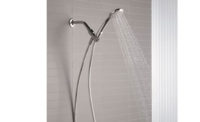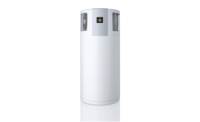A heat pump water heater is like a refrigerator in reverse. Electricity is used to move heat from one place to another instead of generating heat directly. While a refrigerator moves heat from the inside of the box to the surrounding area in order to lower the temperature inside, a heat pump water heater pulls heat from the surrounding area and places it into a tank, at a higher temperature to heat water.
These systems typically have higher initial costs than conventional storage water heaters. However, because they are not generating heat directly, they have lower operating costs.
The Office of Energy Efficiency and Renewable Energy notes heat pump water heaters may save the average household almost $300 a year on its electric bills compared to a standard electric water heater, although some heat pump models are more energy-efficient than others.
The April 2015 mandatory energy-efficiency standards for residential storage water heaters will save about “3.3 quads of energy and result in approximately $63 billion in energy bill savings for products shipped from 2015 to 2044,” EERE estimates.
The efficiency standards will prevent about 172.5 million metric tons of carbon dioxide from being vented into the atmosphere, it adds, which is equivalent to the annual greenhouse gas emissions of about 33.8 million automobiles.
“As we get closer to the April 16, 2015, date when all new electric tank-type water heaters 55 gal. and above must be heat-pump-type water heaters,” explains Bill Riley, sales and marketing for Stiebel Eltron, “we expect heat pump water heating technology to become more understood and accepted as the norm by contractors and consumers alike. This will be reflected in the demand for heat pump water heaters both in the commercial and residential markets.”
Jeff Storie, senior manager of contractor and consumer marketing for A. O. Smith, sees consumer demand being most prevalent in the renovation market. However, he perceives interest will remain high across all segments where going green can reduce costs.
“Across all markets, energy efficiency and cost savings continue to drive technology innovations in the water heater industry,” he says. “For A. O. Smith, that represented a challenge to rethink heat-pump technology. We have put a priority on equipping more and more water heaters with consumer-friendly digital controls.”
Julie Wood, public relations manager for General Electric Appliances, notes: “Water heaters are the second-highest energy users in an average U.S. household. An average homeowner’s current standard electric water heater uses more energy than his refrigerator, dishwasher, clothes washer and dryer combined.”
She agrees consumers are switching appliances to save money. She cites U.S. Department of Energy test procedures where a 50-gal. standard electric water heater using 4879 kWh per year can cost an average homeowner $585 to operate.
“The technology is becoming more efficient and increasing emphasis is being placed on the heat pump water heater’s interaction with home heating and cooling,” says Randeep Pal, director of operations at AirGenerate. “Going forward, energy savings will not only be measured at the product level but also at the net energy or home level.”
Knowing what to look for
Before buying a heat pump water heating system, the DOE suggests users consider: size and first-hour rating; fuel type and availability; energy efficiency (Energy Factor); and overall costs. The Energy Star website notes that if homeowners replacing an electric water heater this year chose an Energy Star-certified heat pump water heater instead of a standard model, about 19.6 billion pounds of carbon dioxide would be prevented from entering the air. That’s the equivalent of taking 1.6 million cars off the road.
In order to estimate the annual operating cost, contractors and homeowners need to know the following about the model: Energy Factor, fuel type and cost (the unit cost of electricity by kilowatt-hour). The formula, as given by the DOE, is: 365 days/year x 12.03 kWh/day ÷ Energy Factor x Fuel Cost ($/kWh) = annual cost of operation.
Many different types of heat pump water heaters are on the market and each has its own benefits. The 50.-gal-capacity Bosch Compress Electric Heat Pump Water Heater offers a ducted cool-air capability to direct cooled, dehumidified air. “It is quiet, efficient and can provide up to a 59% reduction on homeowners’ water-heating costs,” says Craig Lazinsky, marketing program manager for Bosch Thermotechnology.
The Stiebel Eltron Accelera 300 Heat Pump Water Heater is Energy Star-certified and can be connected to a solar photovoltaic system. “It can extract up to 80% of its energy requirements from the energy in the air around it,” Riley says. “The compressor and fan consume 1kWh of electricity to generate the heat equivalent of 3 to 5kWh.”
A. O. Smith’s Voltex Hybrid Electric Heat Pump features a smart user interface that gives consumers options for heating their water with four operating modes — Efficiency, Hybrid, Electric and Vacation, Storie says.
GE’s GeoSpring has a compressor and evaporator integrated into the unit to draw in ambient heat from surrounding air using a fan. “It utilizes advanced heat-pump technology in combination with traditional electric elements to deliver 62% more efficiency,” Wood explains. “Coils wrap the tank all the way to the bottom to transfer the ambient heat into the tank and heat the water.”
Hybrid heat pump water heaters distribute the water-heating load between the heat pump and electric resistance elements. The AirTap Hybrid from AirGenerate has a dual vent configuration, allowing users to duct both exhaust air and air intake to the unit. “It operates the heat pump even in freezing temperatures; the compressor cut-out temperature is at 32° F,” Pal says. “It is engineered to provide maximum output from the heat pump so homeowners can save more energy.”
The biggest draw associated with energy-efficient water heaters is the cost savings, specifically with large families and small-business owners who want to stretch their budgets.
“Green, energy-efficient water heaters are here to stay because of the strong consumer and regulatory demand for green technology that leaves a smaller carbon footprint and is better for the environment,” Storie says. “Interestingly, today new technology in water heaters is running parallel to innovations in green technology and cost savings.”
During the Great Recession, growth in the heat pump water heater market was limited, Lazinsky explains. But manufacturers are starting to see market improvement as homeowners are now willing to spend a little more to save on operating costs.
With the rise in the economy and the upcoming 2015 regulations, the future of heat pump water heaters bodes well.
For additional information on the 2015 regulations, read “Water heaters face 2015 mandate,” pme, January 2014.








